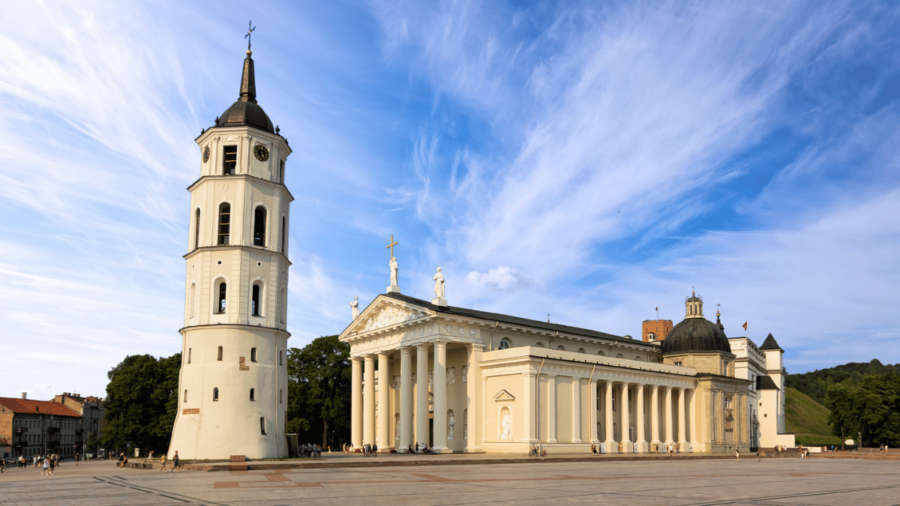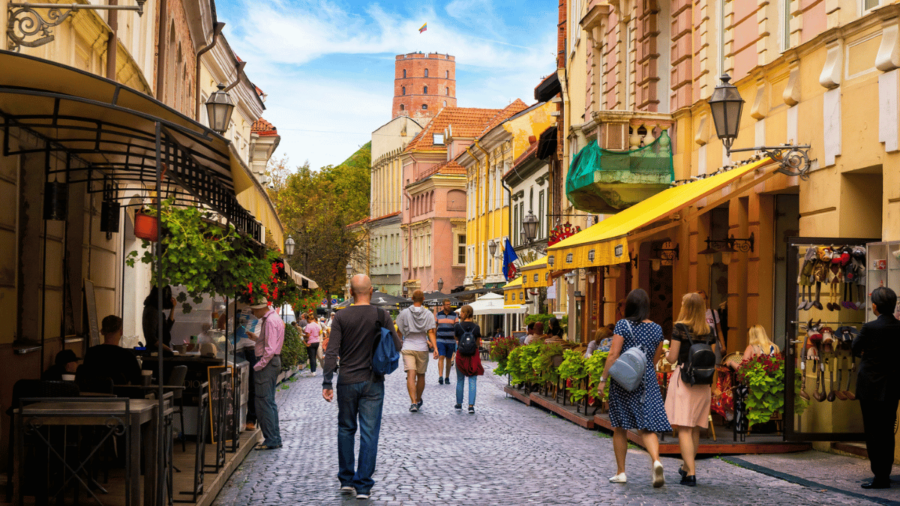
Shortly after several big tech companies announced mass redundancies last autumn, commuters in London started to notice posters plastered on every available wall near their headquarters: “Got fired by Meta or Twitter? Move to Vilnius”.
Sponsored by government agency GoVilnius, the campaign was typical of the Lithuanian capital’s cheeky approach to self-promotion as it looks to cement its reputation as a destination for global technology talent.
What to know before you move to Vilnius
Just a decade ago, Vilnius was relatively unknown compared to other European capitals. But the city is increasingly recognised as a tech powerhouse. International companies such as Unity and Revolut have headquarters there, while a thriving startup scene has given rise to two unicorns: the secondhand clothing portal Vinted and Nord Security, which develops VPNs.
It’s a rapid turnaround for a country that only gained independence from Russia in 1991 and joined the EU less than two decades ago.

According to Laurynas Spangevicius, head of operations at Revolut, Vilnius’ reputation as a tech hub took off after Brexit. Capitalising on its EU membership, the government sought to attract fintechs and startups by streamlining regulations. More than 5,600 people work across 265 fintech companies in Vilnius – including Revolut, which was granted a Lithuanian banking licence in 2018 and now employs around 300 people.
More than 20 business hubs and accelerators as well as dozens of co-working spaces have popped up around the city. Last week, authorities approved the building of a 24,000 square metre city-centre business stadium designed by Zaha Hadid.
Vilnius itself centres around a beautiful Old Town, which is a UNESCO world heritage site. Its winding streets are dotted with colourful buildings, historic landmarks and statues, as well as many bars and restaurants.
In addition to a burgeoning permanent population (it will soon be the largest city in the Baltic region), Vilnius has become popular with digital nomads, who have not yet faced the backlash seen in destinations such as Lisbon or Bali. Lithuania was recently ranked the fifth-best country in the world for remote work.
Getting started in Vilnius
There are several incentives available to foreign talent moving to Vilnius. Skilled workers can take advantage of several schemes, including: government relocation allowances of up to €2,993 (£2,635); a startup visa for entrepreneurs; and a Blue Card that grants a three-year work visa to highly-paid non-EU workers.
Those already lucky enough to have a EU passport, of course, can live and work in Lithuania visa-free.
“All these initiatives, together with the pool of young Lithuanian talent who came back from studying and working abroad, made it into the hub that it is today,” says Spangevicius.
Once there, the paperwork is straightforward (although speaking Lithuanian helps to navigate the process, see below). Foreign residents must declare where they are staying to the Migration Department, while those who are not yet employed must buy health insurance. Otherwise, employers provide compulsory insurance.
For those looking to start a business, the set-up can be done entirely online through a “straightforward and stress-free process”, GoVilnius says. Lithuanian corporate tax is just 15%, well below the Euro area average of 23%.
Speaking English in Vilnius
A common sticking point for those hoping to move to Lithuania is the local language, which is notorious for being difficult to learn. The 2011 census found just a third of Lithuanians spoke English and older people are more likely to have Russian or Polish as a second language than English. New arrivals have reported finding it difficult to navigate the bureaucracy without the help of a translator.
When you speak even three words of Lithuanian, locals think it’s wonderful
However, the majority of the younger generation are conversational or fluent in English. It is the lingua franca of the tech scene and among the expat community, with even stand-up comedy nights now held in English.
“I sometimes need to remind some people in the headquarters that I don’t speak Lithuanian,” says Vincent Bol, director of community support at Vinted, who is from the Netherlands and moved to Vilnius two years ago. “But it’s never an obstacle for me.”
He adds, “When you speak even three words of Lithuanian, [locals] relax, they think it’s wonderful you are investing in learning the language. It’s useful in daily life to know the basics, but I could get by without it.”
What to expect from work and life in Vilnius
Business culture in Vilnius
Working culture is more relaxed than in the likes of New York, Singapore or London. Long hours are usually not expected and overtime is generally capped at eight hours per week.
Employees are entitled to 20 days’ holiday per year, extended to 25 for single parents and under-18s, plus 14 public holidays. Maternity and paternity leave are generous, while both parents can split up to two years of parental leave on part-time salaries, plus an extra year of unpaid leave. Employees can request up to a year off to work on an artistic or scientific project.
“People are still ambitious, but they have a little more understanding about the importance of personal life and mental health. So the working hours here are not as intense as what I saw in big cities,” says Spangevicius.
In general, Lithuanians are considered reserved at first, with a more respectful and formal work culture than western Europe. Hard work, punctuality and modesty are prized. However, tech companies are likely to have a more relaxed, international vibe with co-workers from around the world. Many young Lithuanians will also have taken advantage of their EU passports to work abroad after leaving education.
The cost of living in Vilnius
Prices have been rocketing up in Lithuania, like its neighbours Estonia and Latvia, for the past year. Inflation was at 18.4% in January 2023.
But the cost of living is still much lower than western European countries. Renting a one-bedroom apartment in the city centre costs around €700 (£616) per month and a monthly public transport pass is €29 (£25.50). “People have the freedom to decide where they live, unlike London or Amsterdam. In Vilnius people are able to choose if they want to rent or buy a flat in the city or buy a house just outside,” says Bol.
This is balanced by lower salaries. The minimum wage is just €840 (£740) per month for a full-time worker. Technology workers can expect to earn more, with €2,000 to €3,000 (£1,760 to £2,641) per month typical for a software developer. Wages are being pushed up by the demand for skilled workers from the growing tech scene.
Entertainment and eating out in Vilnius
While Vilnius is a small city, it has a lively social scene with plenty of bars, events and meetups, particularly for the tech community.
“The Old Town is the central district where a lot of people go and spend time, which is really unique and beautiful,” says Spangevicius “But other areas are now emerging… Naujamiestis has more and more of these very trendy, hipster types of bars. The Financial District also has more places to hang out, it’s quite cool because it’s by the river.”

A ticket to world-class opera or ballet can cost as little as €5 (£4.40) at Vilnius’ national theatre. There are also many live music venues, including Peronas Bar, which is located in a converted railway station. However, music lovers might miss some of their favourite acts, as international artists don’t often stop off in Vilnius on their world tours.
Perhaps because of the long and bitter winters – with average temperatures below 0°C from December to February – outdoor activities like hiking, watersports, iceskating and kayaking are popular during the summer. In autumn, locals head to the woods to forage for edible mushrooms. Many follow team sports, especially basketball, which has been described as Lithuania’s “second religion”.
Local food is typical of northern Europe, with meat, dairy and potatoes common ingredients. The national dish, cepelinai, is a potato dumpling filled with pork and covered in a sour cream sauce. There are also plenty of international restaurants around the city. Lithuania has one of the world’s highest levels of alcohol consumption: beer, mead and local spirits are popular.
Safety in Vilnius
Vilnius has a low crime rate and is considered a safe place to visit. Even pickpocketing is rare.
A worry at present is Lithuania’s borders with the Russian enclave Kaliningrad and the pro-Kremlin Belarus. When Russia invaded Ukraine in February 2022, the country declared a state of emergency, which is still in effect in border areas, ports and airports.
However, so far the war has not impacted day-to-day life for most residents, beyond rising prices. What visitors to Vilnius will notice is a sea of blue and yellow flags, posters and murals across the city in support of Ukraine. More than 70,000 Ukrainian refugees have been welcomed to the country so far, and now make up almost 3% of the population.
Spangevicius says: “What [the war] did in Lithuania is get everyone really unified in support of Ukraine. There are numerous initiatives to raise funds, deliver things to Ukraine and help out in any way that we can.”

